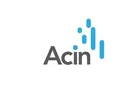Startup spotlight: Acin is the regtech to watch

As we continue our series of flash interviews on startups to watch in 2020, we catch up with CEO Paul Ford of regtech company, Acin.
Hi Paul. Can you tell us a little bit about what Acin does?
Acin is a global regtech data company that is digitising non-financial risk (NFR) for financial institutions. Our ground-breaking solution combines technology, data standards and content to consistently measure, manage and mitigate NFR. Acin connects users within and across banks, allowing them to clearly visualise their data and see how they compare to their peers.
Since 2008, banks have increasingly struggled to manage their NFR effectively amidst the influx of regulation and new controls, incurring spending inefficiencies and billions in non-compliance fines.
Acin uses defined metadata to digitise and map risks and controls, so that gaps and overlaps can be identified for each individual firm, and benchmarked against their peer firms. The Acin network connects these firms together to share data and knowledge, thus keeping all participants up-to-date and able to demonstrate to regulators that they are in control.
What makes Acin's digitisation process unique?
Acin’s solution is completely unique, offering unprecedented clarity and collaboration around NFR – on the intrafirm and interfirm level.
A key component in our digitisation process is our unique, barcode-like Advanced Control Identification Numbers – “ACINs”. These are assigned to individual risks and controls so that they can be mapped; facilitating evaluation both from within companies and across the network. Controls are also assigned standardised KPIs so that performance can be measured.
In parallel, Acin’s unique Networked Defence Model provides continually curated Risk & Control data from across the network, leveraging collective insights to ensure members’ inventories are complete and up-to-date, and learnings and best practice are shared.
This means that Acin not only provides a level of protection and certainty that no firm could achieve in isolation, but it also creates a foundation for excellent business – by connecting the owners of risk (its managers) with the indicators of risk (clear data).
What was Acin's most recent award?
Last month Acin was named to the RegTech100 list, an exclusive directory of the world’s leading RegTech companies, for the second year running. The panel of analysts and industry experts who compiled the list recognised the value of the ground-breaking work we have been doing, and its implications for NFR management, compliance and the financial sector as a whole.
Our inclusion for a second consecutive year is testament to our continued growth and to the value of our innovative solution that is enabling financial institutions to take control of their NFR – ultimately driving positive change through industry collaboration.
As 2019 draws to a close, how is Acin positioned in the industry?
After a pivotal year, the Acin platform has recently expanded to include 15 tier-one banks, in the US, Europe and Asia. This continues our record of rapid growth and adoption amongst largescale multinational banks, which includes the likes of Société General, Standard Chartered Bank and Credit Suisse. From the start, our focus has been on working with the biggest and best banks, as we are confident that our solution is needed.
We are also soon to expand our offering further across the financial sector – we are now extending our network to include Asset Management.
The continued growth of the Acin network is good news for both existing and prospective clients, as each additional member means more shared knowledge and another boost to the network’s inherent defensibility.
SEE MORE:
- Startup spotlight: Previse, allowing suppliers to get paid instantly
- Startup spotlight: Tradeteq's AI-powered trade platform
- Currensea: the UK’s first travel money card linked to your bank
- Read the latest edition of FinTech Magazine, here!
What's on the cards for Acin in 2020?
As regulatory and industry scrutiny of NFR continue to increase, the need for Acin’s solution has never been more pronounced. Against the backdrop of this month’s joint consultation paper from the PRA and BoE proposing a redoubled emphasis on operational resilience, 2020 is set to be a key year for Acin. Our focus will be on growing our technological capabilities, enriching our data outputs and developing our products, as well as enhancing client functionality through a portal giving network members access to exclusive insights.
Large and valuable organisations have already been built to support financial risk management (take the rise of Bloomberg as market risk came to the fore, and ratings agencies as credit risk increased in salience), and the same phenomenon is set to touch NFR as the need to quantify it grows.
Ultimately, Acin will continue to transform the NFR discipline into a similarly data-led science to its financial risk counterparts. We are already in ongoing conversations with several ratings agencies and these are set to continue.
About Paul Ford

Paul Ford is the Founder and CEO of Acin and has over 25 years’ operational and financial services experience. Ford founded Anchura Partners, an operational risk consultancy, in 2010 and grew it to be a highly successful business, before exiting in 2018 to found Acin. Previously, he held COO roles at Barclays Wealth’s Ultra High Net Worth business and in the EMEA division at Credit Suisse – he used this experience to gain an on-the-ground insight into the non-financial risk practices of financial services firms. Prior to this, Ford was a management consultant at Accenture and a Captain in the British Army’s Royal Engineers.
For more information on all topics for FinTech, please take a look at the latest edition of FinTech magazine.

